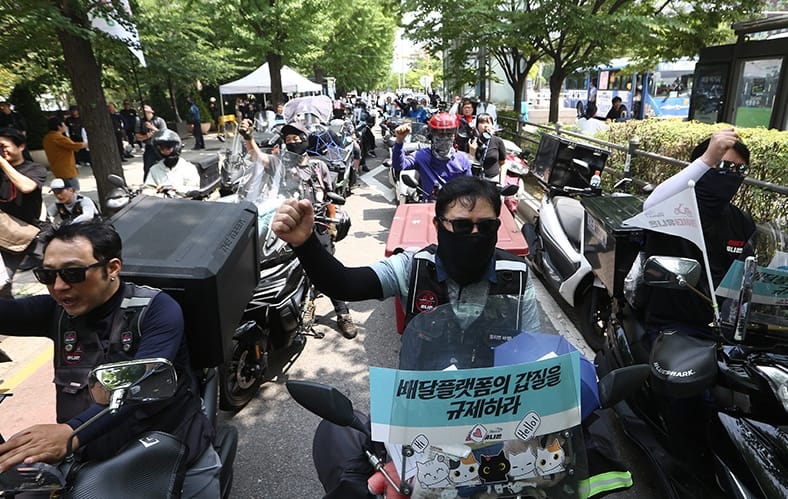South Korea's Response to Rus-NK Deal, Gig Economy Grievances, Mental Illness in the Civil Service
South Korea's Considers Weapons for Ukraine in Response to the North Korea-Russia Alliance, Tensions Between Delivery Platforms and Workers/Store Owners, Increasing Prevalence of Mental Illness Among Civil Servants

South Korea's Considers Weapons for Ukraine in Response to the North Korea-Russia Alliance
The recent signing of a "Comprehensive Strategic Partnership Treaty" between North Korea and Russia has sent shockwaves through the Korean Peninsula and beyond. This agreement, inked on June 19, 2024, marks a significant escalation in the relationship between Pyongyang and Moscow, raising alarm bells in Seoul and Washington. The treaty includes provisions for military cooperation, economic ties, and technological exchange, effectively reviving the automatic intervention clause that was abolished in 1996 during the post-Cold War era. While not explicitly stated, Russian President Vladimir Putin's comments about potential "military-technical cooperation" with North Korea have further heightened concerns about the transfer of advanced weaponry and technology to the hermit kingdom.
The South Korean government's response has been swift and multifaceted. On June 20, the Presidential Office in Seoul issued a strongly worded statement expressing "grave concern and condemnation" over the strengthening of military and economic cooperation between North Korea and Russia. National Security Office Director Cho Hoon-jin, after presiding over an emergency National Security Council (NSC) meeting, emphasized that any cooperation directly or indirectly aiding North Korea's military capabilities would be a violation of UN Security Council resolutions. The government's immediate actions included enhancing monitoring of North Korean activities, reassessing South Korea's defense posture, and intensifying diplomatic efforts with allies, particularly the United States and Japan.
In a significant shift from its previous stance, the South Korean government has announced that it is considering providing lethal weapons to Ukraine. This potential move represents a major departure from Seoul's earlier policy of limiting support to non-lethal aid. The government is weighing various options, including the possibility of supplying precision strike weapons. This consideration is seen as a strategic response to Russia's deepening ties with North Korea, as well as a message to Moscow about the potential consequences of its actions. However, the decision is not without its complexities, as it could have far-reaching implications for South Korea's relationships in the region, particularly with Russia.
Strengthening ties with the United States and Japan has emerged as a key pillar of South Korea's response strategy. Plans are underway for enhanced trilateral military exercises, with the participation of the US aircraft carrier Theodore Roosevelt in a joint exercise called "Freedom's Edge" scheduled for the end of June. This exercise, to be conducted in international waters near the Korean Peninsula, signals a robust show of alliance solidarity. Beyond military cooperation, the three countries are also intensifying their collaboration in intelligence sharing, cybersecurity, and coordinated diplomatic efforts at international forums. This trilateral approach aims to present a united front in addressing the challenges posed by the North Korea-Russia alliance.
On the economic and diplomatic front, South Korea is taking decisive steps to counter the new alliance. The government has announced plans to expand its sanctions list, targeting Russian and North Korean ships, organizations, and individuals involved in arms transportation and oil transshipment between the two countries. Additionally, Seoul is increasing the number of items subject to Russia export controls from 1,159 to 1,402, adding products such as synthetic resin. These measures are designed to tighten the economic noose around both countries and limit their ability to circumvent existing international sanctions. The South Korean government is also actively engaging with international partners to ensure a coordinated approach to sanctions enforcement and to close any potential loopholes.
Domestically, the South Korean government is ramping up preparedness and public communication efforts. Updates to national emergency response plans are underway, and public awareness campaigns are being launched to inform citizens about potential security risks without inciting panic. The government is also engaging with civic groups, think tanks, and the media to foster a broader understanding of the evolving security dynamics in the region. These efforts are crucial in maintaining public trust and ensuring that the population is well-informed and prepared for various scenarios that may unfold.
South Korea is embarking on a long-term strategic reassessment of its foreign policy and security posture. This includes a review of engagement policies with North Korea, consideration of increased defense spending, and exploration of new diplomatic initiatives in the region. The government is also evaluating South Korea's nuclear policy and assessing the country's economic dependencies and vulnerabilities. These deliberations reflect a recognition that the North Korea-Russia alliance represents a significant shift in the regional balance of power, necessitating a comprehensive reevaluation of South Korea's strategic positioning. As part of this process, Seoul is likely to seek an expanded role in international organizations and explore new regional security frameworks to better address the the changes in Northeast Asia.
Tensions Between Delivery Platforms and Workers/Store Owners
South Korea's delivery platform industry has experienced explosive growth in recent years, accelerated by the COVID-19 pandemic. Major players like Baemin, Yogiyo, and Coupang Eats have become household names, reshaping the way Koreans consume food and other goods. However, this rapid expansion has not been without its challenges, as evidenced by the growing tensions between delivery platforms, workers, and store owners. The industry's success has been built on a complex ecosystem involving millions of users, hundreds of thousands of restaurants and stores, and a vast network of delivery riders. Yet, as the sector matures, the cracks in this system are becoming increasingly apparent.